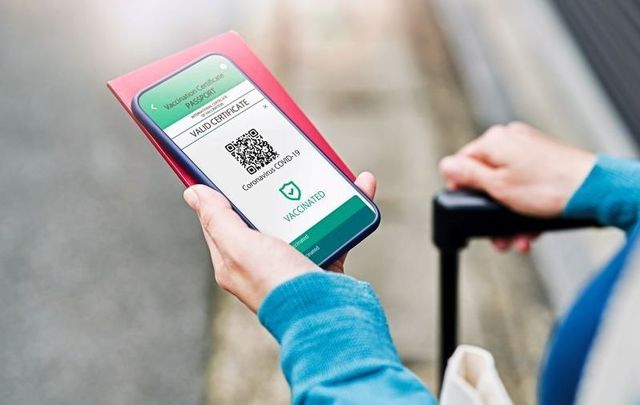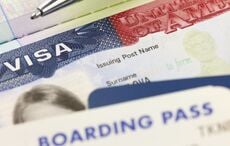Both the Republic of Ireland and Northern Ireland are expected to introduce vaccination certificates, sometimes known as 'vaccine passports,' this month.
The Republic of Ireland will be operating as part of the European Digital COVID Certificate (DCC) programme, while Northern Ireland will have its own proof of vaccination programme.
The travel restrictions for both the Republic of Ireland and Northern Ireland are fluid and can change. You are advised to check what requirements are in place before you travel.
Republic of Ireland’s vaccine passports for international travel
The Republic of Ireland will take part in the EU Digital COVID Certificate (DCC) scheme, which is digital proof that a person has either:
- been vaccinated against COVID-19
- received a negative test result or
- recovered from COVID-19
However, each country continues to be responsible for the definition of its own entry requirements and rules, which are not standardized at the EU level. What is required to enter upon presentation of this certificate depends on the measures and entry rules in place at your destination. As such, the Republic of Ireland may have its own approach to the DCC.
The following information is provided by Ireland's Citizens Information on July 6:
The DCC is only available for people living in the EU.
The Republic of Ireland plans to operate the EU digital COVID Certificate for travel originating within the EU and EEA from July 19. These plans are subject to public health advice on that date.
The DCC, which will include in part relevant information about your vaccine or test or recovery and a unique identifier number, will be free and available in both digital and paper formats. The certificate has a QR code to avoid fraud.
Being vaccinated will not be a pre-condition to travel.
The Irish government has yet to publish official guidelines on how to obtain a DCC, saying on June 28: "Teams across the public service are working together to deliver the EU Digital COVID Certificate in Ireland and you will be clearly notified of the steps needed to access the EU Digital COVID Certificate soon."
On July 6, however, Ireland’s Minister for Transport Eamon Ryan told reporters: “Next week they’ll start to be issued by email and by post and for everyone that needs it for international travel before July 19.”
The Irish government currently advises against all non-essential international travel before July 19, 2021. If your travel is essential, you should check the entry restrictions applied by other countries. The Department of Foreign Affairs (DFA) has country-specific travel advice pages.
From July 19, the Republic of Ireland is expected to align itself with the EU's travel restrictions and 'emergency brake' system. There are several scenarios for people arriving in the Republic of Ireland that could come into effect from July 19:
1. Arriving in the Republic of Ireland from the EU or EEA from July 19 and subject to public health advice:
If you have a DCC and are arriving into the Republic of Ireland from within the EU or EEA, no RT- PCR test on arrival is needed and no quarantine is needed. (*If your DCC is based on a non-RT-PCR test [antigen] you will need to get an RT-PCR test taken within 72 hours before your arrival.)
If you do not have a DCC and you are arriving into the Republic of Ireland from within the EU or EEA, an RT-PCR test is needed on arrival but there is no quarantine requirement.
2. Arriving in the Republic of Ireland from outside of the EU or EEA from July 19 and subject to public health advice:
An emergency brake system will be applied quickly to countries where a variant of concern or interest arises. This will be coordinated at EU level to protect against the importation of variants.
If an emergency brake is applied to a country, the Irish government's advice will be to avoid travel to that country.
2a. Arriving from outside EU where the emergency brake has not been applied
If you arrive in the Republic of Ireland from outside the EU where an emergency brake has not been applied and you have valid proof of vaccination, you will not need to do any travel-related testing or quarantine.
If you do not have valid proof of vaccination, you will need to:
- Show evidence of a negative RT- PCR test result within 72 hours before your arrival
- Self-quarantine (home quarantine)
- Undergo post-arrival testing - this will be provided through the HSE
2b. Arriving from outside EU where the emergency brake has been applied
If you have proof of vaccination, you will need to:
- Show a negative result from a RT- PCR test taken no more than 72 hours before arrival
- Self-quarantine (home quarantine)
- Undergo post-arrival testing - this will be provided through the HSE
If you do not have valid proof of vaccination, you will need to:
- Produce evidence of a negative result from a RT- PCR test undertaken no more than 72 hours before arrival
- Complete a mandatory hotel quarantine
- Undergo post-arrival testing
Citizens Information also notes that the approach to travel outside the EU/EEA will also apply to travel to and from Great Britain and the US.
There will be no restrictions on travel to or from Northern Ireland. However, if you arrive into Ireland through Northern Ireland and you have been overseas in the 14 days before you arrive, you must comply with the relevant restrictions.
Northern Ireland's vaccine passports for international travel
On June 24, Northern Ireland's Department of Health said that its vaccine certificates will be issued first as hard copy format with a digital alternative to be available by mid-August.
As of July 6, interim arrangements were introduced by Northern Ireland's Department of Health to allow people to travel before official COVID-19 vaccine certification comes into place later in July.
The interim written confirmation, only valid until 11:59 pm on July 31, is only available to people who have:
- received two doses of the COVID-19 vaccine in Northern Ireland
- and can provide proof of holiday or flight bookings (up to and including 19 July 2021) to only countries abroad that require verification
If you meet those requirements, you can apply for the interim vaccination certification here online.
If you have travel plans after July 19, 2021, you should wait for the official vaccination certification to become available later in July.
#COVID19 VACCINE CERTIFICATION UPDATE@HSCBoard pic.twitter.com/KlzhRIF82O
— Department of Health (@healthdpt) July 5, 2021
Northern Ireland's Minister for Health Robin Swann said on July 5 that in addition to the interim certification system, his officials are working on a comprehensive certificate system (CCS).
“The final CCS will take the form of a printed certificate supplemented by a mobile phone app," Minister Swann said
“This system will provide internationally accepted proof that either the holder has received both vaccine doses at least two weeks prior to travel or has demonstrated immunity to the virus or has received a negative test in the preceding 72 hours.
“The comprehensive solution is expected to be available before July 19."
The full system, currently undergoing cybersecurity checks, will provide certification to an agreed UK-wide format and will be fully operational when the interim arrangements expire.
You can read FAQs about Northern Ireland's vaccine certificate here.

Are you planning a vacation in Ireland? Looking for advice or want to share some great memories? Join our Irish travel Facebook group.




Comments